Book contents
- Frontmatter
- Contents
- Preface
- Introduction: Can the state rule without justice?
- Part One An outline of a materialist political theory
- Part Two An assessment of the place of justice in the state
- 5 Ideal justice
- 6 Property and justice
- 7 Repression and radical justice
- 8 Justice and materialism
- 9 Equality and liberty
- 10 Class and the limits of control
- Part Three A functional view of political institutions
- Part Four An account of the community of states
- Part Five A reflection on the transition to a new kind of state
- Conclusion: State, class, and democracy
- Notes
- Index
- Frontmatter
- Contents
- Preface
- Introduction: Can the state rule without justice?
- Part One An outline of a materialist political theory
- Part Two An assessment of the place of justice in the state
- 5 Ideal justice
- 6 Property and justice
- 7 Repression and radical justice
- 8 Justice and materialism
- 9 Equality and liberty
- 10 Class and the limits of control
- Part Three A functional view of political institutions
- Part Four An account of the community of states
- Part Five A reflection on the transition to a new kind of state
- Conclusion: State, class, and democracy
- Notes
- Index
Summary
What do we do with the Nazi state? It seems to fit with one of our key claims, the claim about the state functioning to perpetuate the economy. But it is the other claim, the one about justice being a necessity for ruling, that gives us trouble when we come to Hitler and his twelve-year empire. He destroyed civil and political liberties in instituting a reign of terror designed to stamp out all resistance. The independence of the courts was subverted, making criminal courts instruments of arbitrary state violence and civil courts instruments for aggrandizing the cartels. The universality of the law was abrogated through allowing the SS and the Gestapo to make charges and execute punishment as they chose. Shouldn't such a despotism have collapsed of its own weight rather than have waited to fall in a war that mobilized the human and industrial power of the Allies?
General social improvement
The conclusion derived from the Nazi state would seem to be that justice is not essential to the state. There are just and unjust states, and to deny this is to display an unhealthy moral sense. The Third Reich was an unjust state if there ever was one, whereas to import the idea of justice into the state is an implicit apology for despotism. The alternative suggested by this criticism moves in the direction of an ideal conception of political justice.
- Type
- Chapter
- Information
- The State and JusticeAn Essay in Political Theory, pp. 67 - 79Publisher: Cambridge University PressPrint publication year: 1989

